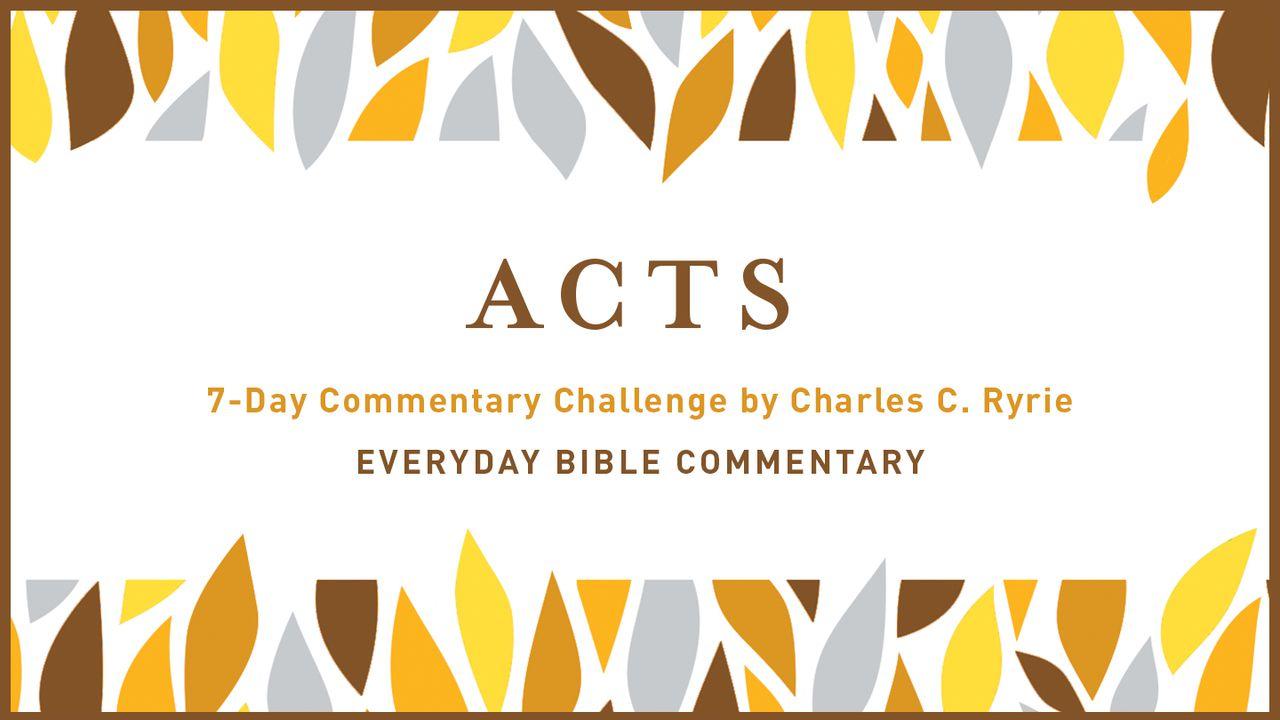7-Day Commentary Challenge - Acts 1-3 Exemplo

THE MESSAGE, 3:12–26
The Introduction, 3:12
As on the day of Pentecost, Peter here used a current event or the healed man as an object lesson to introduce his message to the people who had gathered. He also rebuked them, not for their surprise at what had occurred, but for their lack of comprehension as to how it had happened—as if either John or himself were able to perform such a miracle.
The Theme, 3:13–18
As at Pentecost the theme of Peter’s sermon was: Jesus, whom you killed, is the Messiah.
Almost as remarkable as the healing of the lame man is the transformation in Peter, for the same man who two months before had denied Jesus was now standing before some of the same crowd proclaiming Him. The theme of the sermon was developed by designating the Lord in five ways and making five statements about Him. The five designations were: (1) Servant (v. 13 rather than “Son”). This would immediately identify Jesus of Nazareth with the Servant-Messiah of the Old Testament (Isa. 42:1–9; 49:1–13; 52:13–53:12) and emphasized Peter’s point that Messiah was not only a conquering ruler but a suffering servant (v. 18). (2) Jesus (v. 13) linked Messiah to the man of Nazareth who was only too well-known to this crowd. (3) and (4) The designations Holy and Righteous One asserted His equality with God and affirmed the deity of Jesus (v. 14). (5) Prince of life (v. 15), which means literally author or leader of life (cf. 5:31; Heb. 12:2 for the only other occurrences of the word).
The five statements about the Lord were these: (1) He is exalted (v. 13); (2) this is the same One who was delivered up by the people (v. 13); (3) He was falsely accused (vv. 13–14); (4) He was killed (v. 15); but (5) God raised Him from the dead and you know it (v. 15).
Peter, then drawing all this together, answered the original question—How was the lame man healed? It was His name through faith in His name (v. 16) that accomplished the miracle.
The Conclusion, 3:19–26
The only conclusion in view of the evidence was that it is imperative to repent. These Jews were asked to change their minds about Jesus and change their way of life by turning to the Lord. Peter promised that this would bring forgiveness of sins and the return of the Lord to establish the kingdom promised to Israel. (The words “in order that” in v. 19 should be translated by the phrase “that so.”) For some, this promise concerning the kingdom has posed a difficult problem; for they ask, “Would the kingdom have come then if these people had repented?” The answer need not be given, for the question is hypothetical since the plan of God left in no doubt the disposition of this offer by the people at that time. And yet it is true that the repentance of Israel will bring forgiveness of sins and the ushering in of the kingdom eventually. The phrase “times of refreshing” (v. 19) is evidently a synonym for the phrase “restoration of all things” (v. 21) or the millennial kingdom. But that kingdom will not come, apart from personal repentance. This was what the Jews rejected in Christ’s ministry (cf. Matt. 4:17), and it was the same thing that they rejected in Peter’s ministry on that day.
Note from the Publisher: We hope that you have been encouraged by this 7-day commentary challenge from Charles C. Ryrie. You can pick up a copy of Acts - Everyday Bible Commentary at moodypublishers.com
Escritura
Sobre este plano

This commentary challenge is taken from the Everyday Bible Commentary on Acts 1-3, focusing on birth of the Church through the power of the Holy Spirit. This plan is for anyone who desires to deepen their study of Scripture and begin to discover the profound moving of the Spirit in the early Church.
More

